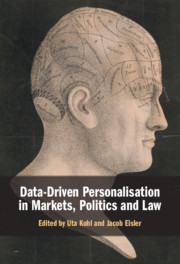Book contents
- Data-Driven Personalisation in Markets, Politics and Law
- Data-Driven Personalisation in Markets, Politics and Law
- Copyright page
- Contents
- Figures
- Tables
- Contributors
- Preface
- Part I Introduction: Theoretical Perspectives
- 1 The Pixelated Person: Humanity in the Grip of Algorithmic Personalisation
- 2 Personalisation and Digital Modernity: Deconstructing the Myths of the Subjunctive World
- 3 Personalisation, Power and the Datafied Subject
- 4 Personal Data and Collective Value: Data-Driven Personalisation as Network Effect
- Part II Themes: Personal Autonomy, Market Choices and the Presumption of Innocence
- Part III Applications: From Personalised Medicine and Pricing to Political Micro-Targeting
- Part IV The Future of Personalisation: Algorithmic Foretelling and Its Limits
- Index
2 - Personalisation and Digital Modernity: Deconstructing the Myths of the Subjunctive World
from Part I - Introduction: Theoretical Perspectives
Published online by Cambridge University Press: 09 July 2021
- Data-Driven Personalisation in Markets, Politics and Law
- Data-Driven Personalisation in Markets, Politics and Law
- Copyright page
- Contents
- Figures
- Tables
- Contributors
- Preface
- Part I Introduction: Theoretical Perspectives
- 1 The Pixelated Person: Humanity in the Grip of Algorithmic Personalisation
- 2 Personalisation and Digital Modernity: Deconstructing the Myths of the Subjunctive World
- 3 Personalisation, Power and the Datafied Subject
- 4 Personal Data and Collective Value: Data-Driven Personalisation as Network Effect
- Part II Themes: Personal Autonomy, Market Choices and the Presumption of Innocence
- Part III Applications: From Personalised Medicine and Pricing to Political Micro-Targeting
- Part IV The Future of Personalisation: Algorithmic Foretelling and Its Limits
- Index
Summary
In this chapter, I discuss the role of personalisation in a wider narrative of the development of democratic societies, in terms of digital modernity, driven by a vision of data-driven innovation over networked structures facilitating socio-environmental control. This chapter deals with narratives of how modernity plays out and is implemented by institutions and technologies, which are inevitably partial, and selective in what they foreground and ignore. It begins with a discussion of digital modernity, showing how data-driven personalisation is central to it, and how privacy not only loses its traditional role as a support for individuality, but becomes a blocker for the technologies that will realise the digitally modern vision. The chapter develops the concept of the subjunctive world, in which individuals’ choices are replaced by what they would have chosen if only they had sufficient data and insight. Furthermore, the notions of what is harmful for the individual, and the remedies that can be applied to these, become detached from the individual’s lived experience, and reconnected, in the policy space, to the behaviour and evolution of models of the individual and his or her environment.
Keywords
- Type
- Chapter
- Information
- Data-Driven Personalisation in Markets, Politics and Law , pp. 37 - 54Publisher: Cambridge University PressPrint publication year: 2021
- 1
- Cited by

